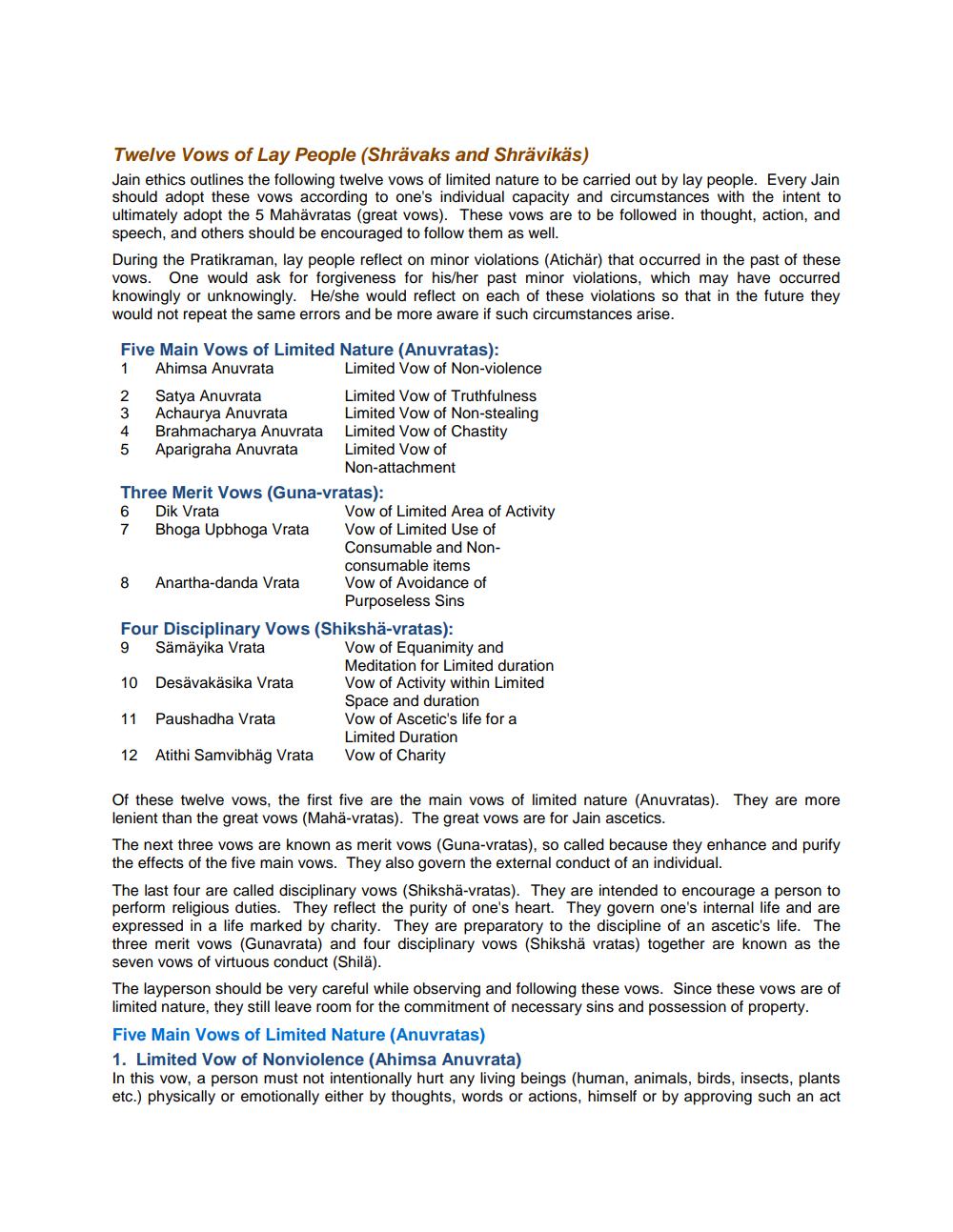Book Title: Twelve Vows of Lay People Author(s): Pravin K Shah Publisher: JAINA Education Committee View full book textPage 1
________________ Twelve Vows of Lay People (Shrävaks and Shrävikäs) Jain ethics outlines the following twelve vows of limited nature to be carried out by lay people. Every Jain should adopt these vows according to one's individual capacity and circumstances with the intent to ultimately adopt the 5 Mahävratas (great vows). These vows are to be followed in thought, action, and speech, and others should be encouraged to follow them as well. During the Pratikraman, lay people reflect on minor violations (Atichär) that occurred in the past of these vows. One would ask for forgiveness for his/her past minor violations, which may have occurred knowingly or unknowingly. He/she would reflect on each of these violations so that in the future they would not repeat the same errors and be more aware if such circumstances arise. Five Main Vows of Limited Nature (Anuvratas): 1 Ahimsa Anuvrata Limited Vow of Non-violence 2 Satya Anuvrata Limited Vow of Truthfulness 3 Achaurya Anuvrata Limited Vow of Non-stealing Brahmacharya Anuvrata Limited Vow of Chastity 5 Aparigraha Anuvrata Limited Vow of Non-attachment Three Merit Vows ( Guna-vratas): 6 Dik Vrata Vow of Limited Area of Activity 7 Bhoga Upbhoga Vrata Vow of Limited Use of Consumable and Non consumable items 8 Anartha-danda Vrata Vow of Avoidance of Purposeless Sins Four Disciplinary Vows (Shikshä-vratas): 9 Sämäyika Vrata Vow of Equanimity and Meditation for Limited duration 10 Desävakäsika Vrata Vow of Activity within Limited Space and duration 11 Paushadha Vrata Vow of Ascetic's life for a Limited Duration 12 Atithi Samvibhäg Vrata Vow of Charity Of these twelve vows, the first five are the main vows of limited nature (Anuvratas). They are more lenient than the great vows (Mahä-vratas). The great vows are for Jain ascetics. The next three vows are known as merit vows (Guna-vratas), so called because they enhance and purify the effects of the five main vows. They also govern the external conduct of an individual. The last four are called disciplinary vows (Shiksha-vratas). They are intended to encourage a person to perform religious duties. They reflect the purity of one's heart. They govern one's internal life and are expressed in a life marked by charity. They are preparatory to the discipline of an ascetic's life. The three merit vows (Gunavrata) and four disciplinary vows (Shikshä vratas) together are known as the seven vows of virtuous conduct (Shilä). The layperson should be very careful while observing and following these vows. Since these vows are of limited nature, they still leave room for the commitment of necessary sins and possession of property. Five Main Vows of Limited Nature (Anuvratas) 1. Limited Vow of Nonviolence (Ahimsa Anuvrata) In this vow, a person must not intentionally hurt any living beings (human, animals, birds, insects, plants etc.) physically or emotionally either by thoughts, words or actions, himself or by approving such an actPage Navigation
1 2 3 4
